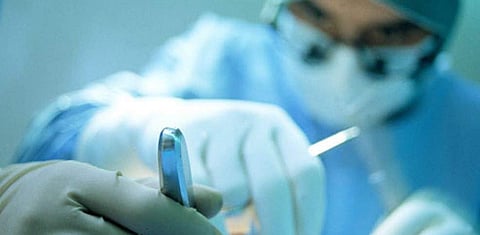

KOCHI: As the number of patients awaiting donor kidneys and those undergoing dialysis treatment keep rising in the state, the Kerala State Organ and Tissue Transplant Organization (K-SOTTO) has adopted a significant step to promote swap-kidney transplants. As part of its efforts, the government body will prepare standardised guidelines and networks for such transplants and create public awareness.
“Even in cases where we have family members willing to donate the organ, transplantation may not be possible due to blood group incompatibility and immunological mismatch. In such a case, swap-kidney transplant is an option. We may have donors and recipients facing the same problem in other hospitals or cities. We communicate with them, check compatibility and move forward with transplant surgery,” said Dr Noble Gracious, executive director of K-SOTTO.
“Around 30% of patients are on the list awaiting donors because of incompatibility. They have donors, but there is a mismatch. Swap-kidney transplants can help such patients. If we develop a mechanism, we can save many patients. By working out combinations, the possibilities of transplant will increase. Swap-kidney transplants with the right donor, and recipients can reduce the chances of infection and rejection risk and will reduce the cost of treatment,” said Dr Feroz Azeez, consultant nephrologist at IQRAA and Aster MIMS Hospital, Kozhikode.
In 2021, the Kerala High Court allowed swap-kidney transplants between non-relatives.
“There are risk factors involved. We need to convince the families about the benefits. Networking of patients and hospitals is possible with the registry and software available with K-SOTTO. What is more important is to educate the public,” Dr Noble said, adding that proper guidelines standardising the process can help make the procedure transparent and accessible for the public.
“We have more than 2,000 patients waiting for a kidney transplant in the state. A swap transplant will be beneficial at least for some of them. Moreover, it helps reduce the number of patients undergoing dialysis treatment. If transplant surgery is conducted at an early stage after identifying a condition, the quality of life can be improved,” Dr Noble added.
The process requires coordination between hospitals, logistics services, and the willingness of the families of the parties.
“There should be coordination between surgeons and hospitals on sharing details of patients and willing donors. Logistics is another concern. Transplant centres should cooperate to promote swap-kidney transplants. Government monitoring can make the procedure more transparent,” Dr Noble said, adding that changes in the legal framework can also contribute to bringing change.